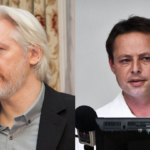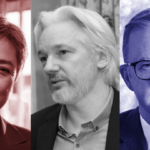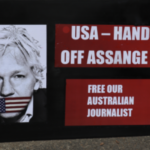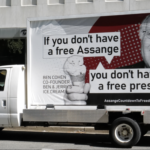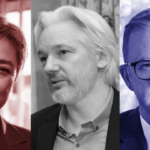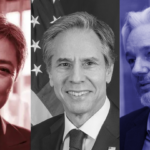Aussie Support for Assange Skyrockets, But US Ambassador’s Claims of a Plea Deal May Be Untrue
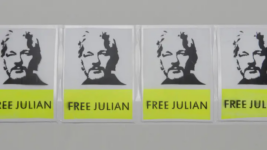
A delegation of six Australian politicians from across the political spectrum will travel to Washington later this month, the Assange Campaign announced on Wednesday, in an attempt to secure the immediate release of Wikileaks founder Julian Assange from London’s Belmarsh prison.
Campaign legal advisor barrister Greg Barns SC outlined that “polling shows nine out of ten Australians think the charges against Julian should be dropped entirely”, which is in stark contrast to four years ago, when the publisher was initially imprisoned on trumped up charges.
Growing local support reflects a spread in awareness of the injustices Assange is subject to at the hands of our greatest “allies” amongst the citizenry, as the Albanese government has shown support for its own national, whereas Morrison acted as if his imprisonment was just desserts.
For long-term Assange supporters, the waters are muddier. Since the Australian journalist entered London’s Ecuadorian Embassy in June 2012, they’ve seen him detained in a similar manner for over a decade now, with his treatment having been recognised as torture at the international level.
The Albanese government has adopted its leader’s mantra “enough is enough” as official policy, and publicly assured on multiple occasions that it’s been raising the issue at the federal level. While more recently US ambassador Caroline Kennedy has suggested a plea deal may be in order.
The truth of the matter, however, is that at the grassroots level, no one knows who or what to believe.
Placating the public
US ambassador Kennedy suggested to SMH in mid-August that a plea deal could be on the horizon for the WikiLeaks founder. This would involve a David Hicks style deal, whereby Assange doesn’t plead guilty but admits the prosecution could convict on evidence and he serve his time here.
Julian’s brother Gabriel Shipton has said a deal breaker would be if the publisher was extradited to the US in order to facilitate this, as many have suggested that Assange’s health has declined so far during four years of prolonged solitary confinement that he wouldn’t survive the US prison system.
A key point here is that Kennedy’s appearance in Australia since last July, marks a change in Australian-US relations as our nation has become of rising strategic importance to the US, which is moving in locally in a military sense, and the ability of Australia to act independently is being curbed.
However, a 1 September WBAI radio interview involving former UK diplomat Craig Murray sees the ardent Assange supporter underscoring that there have been no official approaches from the White House “indicating any willingness to soften or ameliorate their position”.
“The position of the Biden administration still seems to be that they wish to persecute and destroy Julian and lock him up for life for publishing the truth about war crimes and for publishing,” Murray told WBAI’s Randy Credico. “We should never forget Julian is the publisher.”
The former ambassador added that there is “no sincerity” in “the noises” being made. But rather as Australian support is growing for Assange to be released, Kennedy has made the suggestion in an attempt to “placate public opinion in Australia”.
Dwindling authority
Murray’s point is supported by the White House position that US secretary of state Anthony Blinken clearly outlined during the 29 July AUSMIN joint press conference. And this annual meeting between Australian and US foreign and defence ministers notably took place in Sydney.
When a journalist put the question of Assange to the four ministers, Blinken said the US justice department has repeatedly outlined that Assange is “charged with very serious criminal conduct” in connection with “one of the largest compromises of classified information” in US history.
Blinken made his statement in a manner that assumed ultimate authority on the matter, adding that “he is alleged to have committed, risked very serious harm to our national security to the benefit of our adversaries and put named human sources at grave risk”, including that of harm and detention.
“So, I say that only because, just as we understand sensitivities here, it’s important that our friends understand sensitivities in the United States,” the secretary of state told the Australian public.
This followed Australian foreign minister Penny Wong having reiterated her previous statements made earlier that month, which were that it’s been raised at the highest level with the US that the government considers the case has dragged on too long, but there are limits to what it can do.
“I’ve also said that, obviously, that we do what we can, government to government, but there are limits until Mr Assange’s legal processes have concluded,” the foreign minister reiterated at AUSMIN.
Wong has been distinctly more to the point on this matter than her boss, who continues to simply spruik “enough is enough”.
A travesty of global justice
Assange’s drawn-out crucifixion is taking place as his organisation WikiLeaks published thousands of classified US military and diplomatic documents that were leaked to him by US army officer Chelsea Manning, who now walks free in North America.
The White House claims that the Townsville-born son dumped the files without redacting them. But Australian lawyer and journalist Mark Davis confirms at every chance that he was present during one of the most significant releases of documents and he saw Julian erasing thousands of names.
“Julian is not a whistleblower,” said Murray, underscoring that the leaker is considered the criminal in US law. “The whistleblower was Chelsea Manning. Julian is just a publisher, just as The Guardian and The New York Times and The Washington Post were publishers of the same information.”
Assange has been charged with 17 espionage offences contained within the US Espionage Act of 1917, and one charge of computer hacking, under a June 2020 indictment issued by the US Eastern District of Virginia Court, which is US intelligence central, therefore, a distinct type of jury is ensured.
Together these charges carry up to 175 years prison time.
The sinister nature of the US-UK extradition proceedings is that Washington has claimed extraterritorial jurisdiction to reach out across international borders to arrest a foreign national on dubious grounds, for acts carried out upon the soil of other nations.
So, not only is the brave truth-teller’s liberty and mortality on the line here, but so is the future of international press freedoms, as a precedent could be set, wherein governments will be able to cross national boundaries to silence those who publish information deemed to threaten national security.


